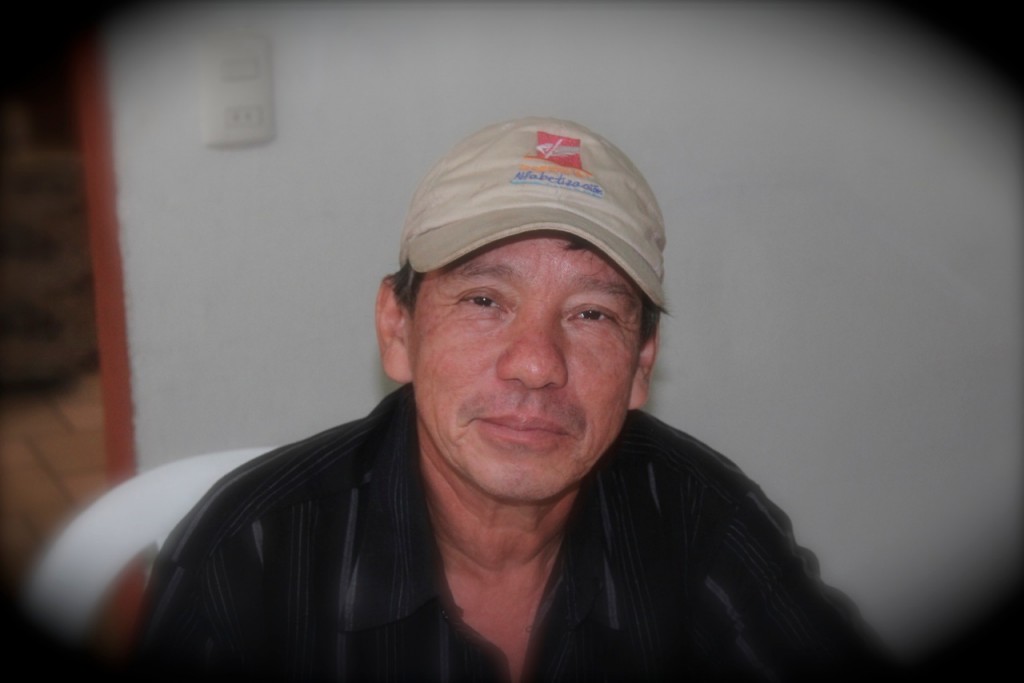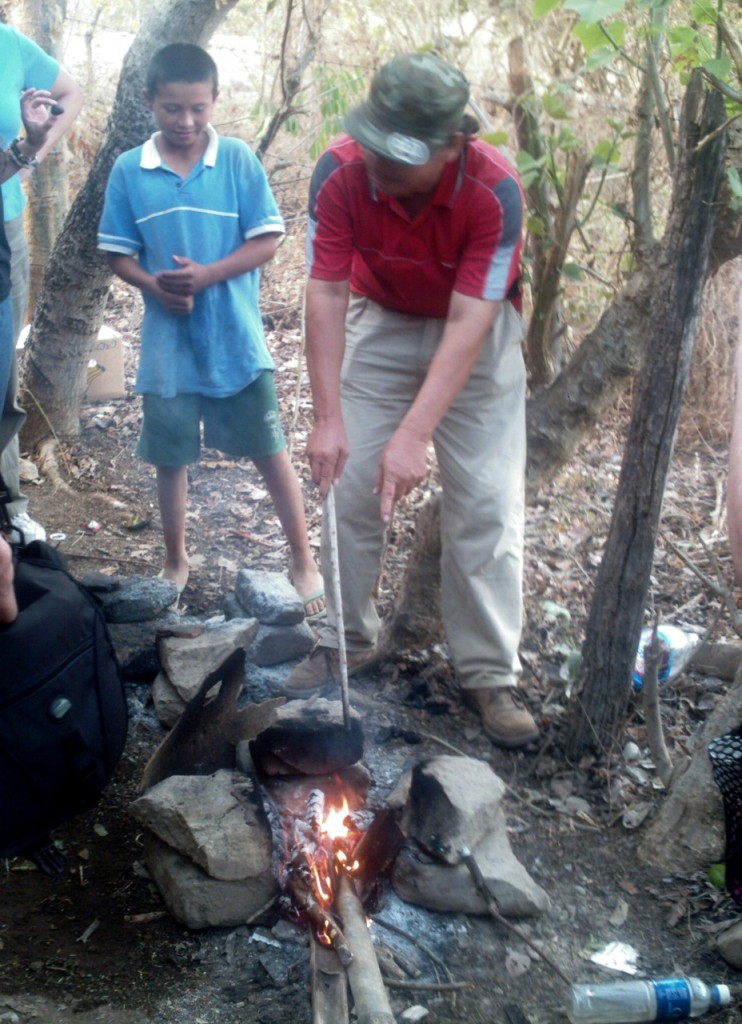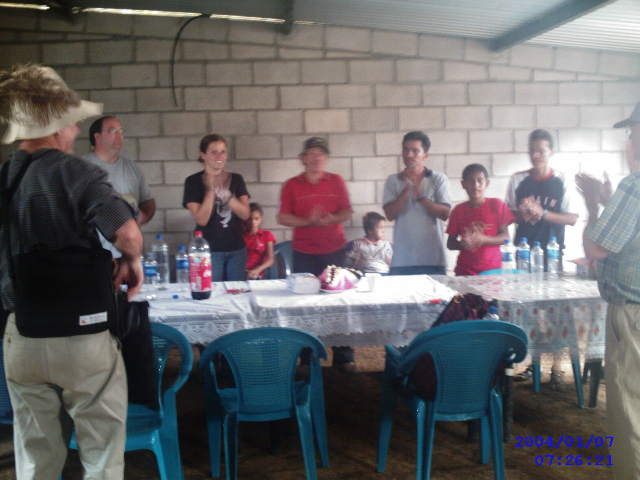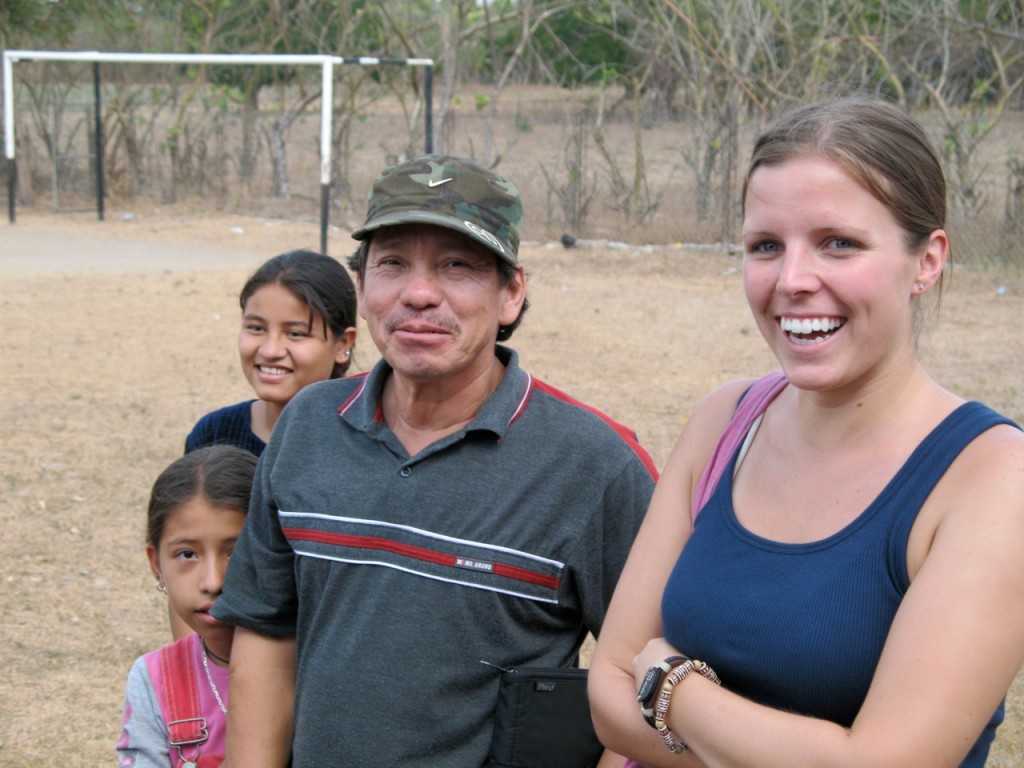
“In 2000 I was part of the team that helped get electricity into our community. All of a sudden when the lights went on, I teared up witnessing it.”
La historia de Orlando Girón en español
Editor’s Note: If you are doing a double take of the year above thinking it is a misprint, let me assure you that 2000 is correct. In fact now in 2013 we are currently helping support our friends from Indiana who are providing solar cell panels as a source for electricity in our sister community in another Salvadoran campesino community one house at a time. Prior to this they heated transmission brake fluid to provide enough light for the children to study at night.
In February, 2007, our group visiting El Salvador combined with another one from Michigan. We joined them in an off-road hike (yes, the trucks can’t even traverse the path) back toward the mountain to spend a few days visiting their sister campesino community. You couldn’t have asked for more welcoming hosts than from these humble folks in Hacienito Uno.
The respected spokesperson of the community greeted us during our first night’s meal with these eloquent words which I shall never forget. “We appreciate your sacrifice of time in coming here. We know you are accustomed to a different standard of living, but hope that we can make you feel comfortable. Please let us know if there is anything you require.”
It was only on a sunrise walk through the mountain with Don that this quiet man privately shared a bit of his own life. I knew I wanted to someday return to hear and document a more complete version of this modest, yet genuine man I came to admire.
(Now five years later I begin by sharing some photos with him of our last visit to refresh our shared memories.)

Orlando prepares cashew nuts from the tree.
Can you describe life for you as a child?
Childhood was tough. I was an illegitimate child born in February, 1960, in Palo Grande near Guazapa in the Cuscatlan department. My mom and us six children lived with her father. She was an extremely hard-working woman who supported us by collecting fruit from the trees on our land which she sold in Suchitoto – a 24 kilometer (15 mile )walk away.
Even from a young age I farmed each morning while attending school each afternoon. After 4 P. M. I had free time for soccer in makeshift courts with my friends. I was able to study through eighth grade before the war began. At that point schools closed because of the volatility and instability as civilians were beginning to be found dead on the streets. Teachers became too fearful to leave their homes to teach.
What other groups in your area were at risk?
Those who lived in Christian-based communities and movements who shared the word of God were especially persecuted and targeted. They were considered enemies. The majority of the people that eventually got involved in the war from my area were these people who participated in Christian causes. Although I personally did not live within one of the C-b communities, I was involved in the church and therefore was still perceived as an enemy.
My sister, for example, was one of the many young people who attended regular meetings with the local priest in Suchitoto. My uncle also was a deacon working closely with the priest. He was killed early in 1979.

That date precedes the beginning of the official Salvadoran war. What were you thinking at the time? Why did you stay?
I had heard talk about the injustices taking place throughout the country related to how the military was treating groups such as the farmers. It never really occurred to me to leave the area. The emphasis in the discussion was on how we had to be involved. I don’t think I really understood the magnitude of the situation. Perhaps if I had, I may have run away. A second reason I stayed was because the area quickly became highly militarized. Anyone who would have tried to leave would have become captured and tortured. It was simply too dangerous to move. None of my family members had any intention of leaving and I could not do so on my own. At the time I was 20 and single.
At what point did the situation escalate in your area?
It all began in 1980 after Monsignor Romero was assassinated when things got worse. The army came into our area and began attacking and we had no choice but to defend ourselves. I picked up a rifle and never put it down until 1992.
Were you able to also farm the land during this war or were you strictly a guerrilla fighter? Was there a formal structure to the organization?
I was a fulltime guerrilla fighter to the full extent of the word. I was given responsibility as squad leader for leading six men. The structure was: there were 24 men in a platoon; 4 squadrons of 6 men. We were on alert 24 hours a day awaiting orders. I was on lookout for any circumstances that might arise. Some days were relatively calm days because the military didn’t advance every day. Other days when the enemy attacked, we would fight the entire day without eating. It was very difficult for us.
Was your primary role to protect your property?
Our main task was to protect the area and the civilian population hidden. Our job was to maintain positions to prevent the military from crossing into those areas where the civilians were hiding. There were some forces in charge of guarding those locations while others were looking ahead for the next strategic positions the civilians could quickly move into when necessary. This was a tricky balance of looking behind and looking ahead.
The women creatively often prepared a special candy made of sugar cane and flour to quiet the children when it was necessary to move them during the night when the enemy was near. Crying would compromise their location. There were a number of things done like that to reduce the chances of being discovered. Moving women who were giving birth was another challenge.
As a squad leader it was my duty to make sure the positions were held to protect the women and children civilians. When the civilians were not in our area it was a load off our shoulders making our job much easier. At that point we could more effectively interact with the military.
In other words, protecting the women and children was a real liability holding you back from actually fighting the enemy? Was this ongoing throughout the war?
In 1986 the military almost evacuated all civilians from that area. Then they switched strategies and began to take people into San Salvador in groups. They found some families who were hidden in tunnels and all kinds of remote places. The reasoning behind the evacuation decision was the military felt that with the families of the guerrillas gone, there would be no support system left for the guerrilla forces such as food or nurses to care for them.
Did this plan work as they expected?
Not at all. Even though the number of advancing soldiers was incredible, we guerrillas stood our ground and continued fighting to hold our strategic positions. It was easier now that we didn’t have to be protecting the women and children. We used guerrilla warfare which consisted of tactics such as killing one or two soldiers and then running away as quickly as possible. Eventually toward the end of the war, the army grew desperate and moved away.
How could a small group of guerrilla fighters with limited equipment and training compete with a larger, better-trained and equipped military?
The army had a clear daytime air advantage with their planes and helicopters being able to see their target. Their numbers were by far superior to ours. In El Mangal, a place where many of my family members were attacked, there were 2,000 soldiers to 250-300 guerrilla fighters. Our advantage as guerrilla fighters was that we knew the area geographically like the palm of our hand. At night we were able to move around without being detected. We often used the trees or trenches to establish our lines.
Were there civilian massacres in your area?
In the village I just mentioned about 200 people were killed. We felt badly, but there was nothing we could have done to protect those civilians because the army paratroopers landed via helicopters. We heard it happen, but were unable to help.
Why was the military so intent on persisting their efforts in your local area for so long?
There were two reasons. First, this was the area closest to San Salvador on a hill that had guerrilla presence which the military had a need to get rid of. Second, the road to Suchitoto had been taken by the guerrilla forces. The military wanted to re-gain that road because it was a strategic location for control.
How did you keep up your spirits when you needed to stay awake 24 hours a day?
We set up camp and protection and then took turns sleeping. A team of women cooked. They had to be careful of the smoke that it wouldn’t draw the attention of planes. The same was true with hanging out the laundry. Lest our safety would be jeopardized, we could only stay in one location for about three days before needing to move and set up camp elsewhere.
What kinds of physical dangers did you personally encounter?
[He smiles and gives a long, labored sigh while looking upward and saying “ God has always been with me.”]
There were several very dangerous close calls. In 1984 while I was on patrol, I wasn’t concentrating and stepped on a mine injuring my foot. I also got shrapnel in my arm which still bothers me when I use my machete.
In 1985 we had a confrontation with the army resulting in 4 guerrillas getting killed that day. There were only 25 of us and 500 soldiers in their army battalion. Three of us were put in the rear. Again, I wasn’t paying attention probably from fatigue and they shot my friend and killed him and injured my other friend all in the first spray of bullets. I was shot in the back as I was trying to get away but God was with me that day. I was losing blood and couldn’t see very well, but my fellow guerrillas helped me. It took many days to recover. The doctor told me I was a very lucky man. The bullet had just missed hitting my spine. I still carry that M-16 bullet with me as a souvenir.
On December 24, 1985 or 86 in the area of Cinquera, Canton Guadeloupe, there was an ambush set by other guerrillas who didn’t know we were in the same area. At 10 P.M. I got close and the lookout fired, but it misfired. Had it fired, I would not be here today. I identified myself and was a lucky man. It would have been a case of a casualty by friendly fire.
[Just when we think he is finished telling of his miraculous escapes of death, he starts to laugh and somewhat sheepishly begins another tale.]
Then in the 1989 offensive here in San Salvador we were looking out into the street and a helicopter shot a rocket resulting with shrapnel into the back of my knee.
Wow! Have you asked yourself how you’ve been spared so many times?
I know there is a God and only He knows why I am still alive. This past December I was involved in a motorcycle accident. A car hit me resulting in a broken collarbone and knee. I lay on the ground for an hour and woke up in a clinic. I could not remember a thing. There is a reason God still allows me to be here.
You were under such constant danger during the 12 years of the war. Did you ever consider giving up or coming into San Salvador?
When I would become fatigued and see the far-off distant lights of the city, I would think to myself, “What I would give to have a life in another place.” But then reality would set in and I knew the risk of capture was too great to consider leaving.

Did you have nightmares after the war?
I had dreams about the war, but not nightmares. There was nothing with a recurring theme.
What kinds of positive changes resulted for the country as a result of the 12 -year civil war?
When the negotiations began, there were a lot of expectations that many changes would take place. But because of all the give and take involved, many people including myself feel that the changes that actually happened as a result of the war were mostly in the military sector rather than in the social sector. Obviously, a young democratic state was rising as a result of the war, but economically and socially these things were addressed during the war but have not been touched in a sense since the Peace Accords have been signed.
What happened for you personally after the war ended?
When the negotiations began, there was a sense of peace and we thought we would live a different kind of life as a result. I married and moved to the community in which I now live which was already populated in 1987. I did not know anyone who lived there and initially had no leadership role.
You are certainly a respected leader now. What exactly is your role?
As time passed and I collaborated with the people in the community of Hacienito Uno, they began to trust me. I am on the city hall team of Suchitoto. The mayor there has a team like a city council comprised of representatives from the 12 surrounding communities. I have served three consecutive seven-year terms.
What is the size of this community now and are the younger people staying or going elsewhere when they get older?
We have 83 families with 350 people. We are fairly self-sustaining. As a farming community we primarily grow beans, corn, and sugar cane. Young people are not keen on staying on the farm. They prefer to go to San Salvador or to another city to look for a job. Some are lucky to find jobs and others are not. As a last resort, many will join the police force.
Do you approve of joining the police?
I don’t want it for my sons because carrying a weapon is a big responsibility. I would not see that career as a good option for them.
Tell us about YOUR family.
After living together for ten years, my wife and I married in 2002. We have three children: Roberto – 20, Jasmine – 16, and Christian – 13.
What DO you see as a good future for your children?
As a parent you want your kids to do well and have a better future. Thanks to a church scholarship, my older son is ready to graduate and plans to be a college professor. It is hard to get a job now.
What do you see as the advantages of living within the campesino community?
We all know each other well and are willing to mutually help each other. If someone’s cow gets out, another person pushes it back into the fence. We are willing to do whatever benefits the community as a whole.
Has your community had problems with gang infiltration or recruitment?
Thank God, no.
What are the problems living within the community?
Little feuds between people are very common, but we try to intervene to solve them.
What future do you see for the campesino life in general? Can it survive given the fact that the young people are choosing to leave?
It’s not easy for youth to get jobs and unfortunately many will join gangs. A lot depends on the values children are taught at home. The state also needs to be responsible in creating opportunities for the youth to participate.
Do you have any regrets in your life?
No, none.
What are some of the highlights of your life?
Personally I am grateful that my overall good health allows me to continue to help others.
Prior to 2000 our only source of light in our homes was a special kind of gas which was inefficient. I was part of the team that helped get electricity into the community. All of a sudden when the lights went on, I teared up witnessing it.
Seeing youth including my children have better possibilities in their future. If they have been taught well early in life, their opportunities are much better.
What dreams do you have for your country?
It is complicated. Certainly I hope we can live in real peace, not in a life where death is right around every corner like in recent years. I would like to see the youth have healthy spaces so they don’t become involved in gangs. I would like to see the farming sector have the necessary support to improve their quality of life.
In short, I dream of a prosperous El Salvador.
Editor’s Note: A common thread I notice throughout the interviews we have conducted is the deep humility of the people. This is so apparent today in Orlando whose numerous close encounters with death during the war alone would make a “nail biting, sitting on the end of your chair” action movie. However, I get the feeling that he would not have even brought the topic to our attention had we not prodded him to share beyond the one sunrise walk story Don heard in 2007. In hindsight he simply shrugs, thanks God, and lives his life in gratitude by serving the needs of his community.
The other thing that impresses me about Orlando is how articulate this unassuming man with an eighth grade education is. In all the hundreds of hours of interactions with close to a hundred different people, I haven’t heard anyone explain the results of the civil war like Orlando did so casually, candidly, and succinctly. Just to review:
“ . . .the changes that actually happened as a result of the war were mostly in the military sector rather than in the social sector. Obviously, a young democratic state was rising as a result of the war, but economically and socially these things were addressed during the war. However they have not been touched in a sense since the Peace Accords have been signed.”


